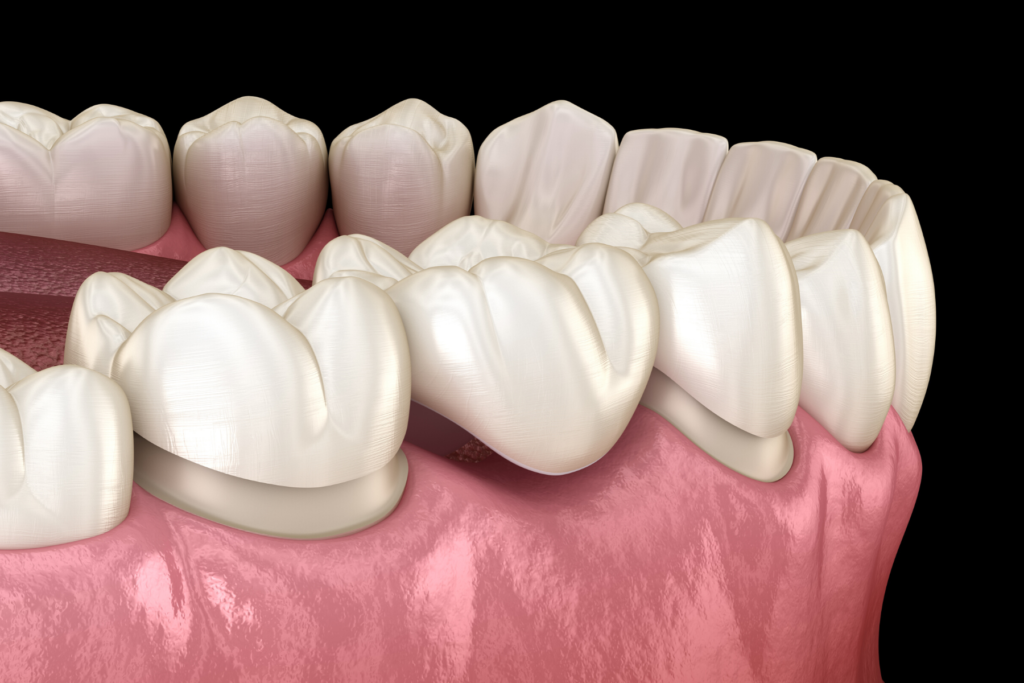
Crowns and Bridges
Crowns and most bridges are fixed prosthetic devices that are cemented onto existing teeth or implants and can only be removed by a dentist.
What is a dental crown?
A dental crown, also known as a cap, is a restoration that covers a tooth to correct its form, strength, function and/or enhance its natural appearance.
A dental crown can provide support to teeth with large fillings and little tooth structure remaining; protect a tooth weakened by deep decay or cavities and prevent it from breaking; cover teeth after a root canal treatment to prevent them from fracturing; hold together parts of a cracked tooth or restore a broken or severely worn-down tooth. They are also used to cover dental implants and can hold dental bridges and partial dentures in place.
Crowns are also used in cosmetic dentistry as part of a smile makeover. They can rectify the appearance of misshaped, misaligned or severely discolored teeth.
Crowns can be made of varying materials. Depending on your individual needs and the location of the crown, Dr. Mauricio Galvis, dentist in Pointe-Claire, will recommend the most appropriate choice.
What is the procedure for a dental crown?
You will require two visits to our office to get a dental crown. To prepare the area for a crown, you will receive a local anesthetic to numb the tooth and gum tissue. Then your tooth will be shaped to fit inside the crown.
Once the tooth has been filed to make room for the crown, we will make an impression to create a temporary crown to protect the tooth. The impressions will be sent to a dental laboratory where the permanent crown will be manufactured. On the second visit, we will remove the temporary crown and cement the permanent one in place.
What is a bridge?
A bridge, also called fixed bridge or fixed partial denture, is an alternative to replace one or more missing teeth. It is made of artificial tooth or teeth held in place by your own teeth or by dental implants surrounding the empty space. If the bridge is secured by your natural teeth, these are capped by a crown to anchor it.

Gaps left by the missing tooth (or teeth) can make your remaining teeth shift into the empty spaces and impact your bite (occlusion). Improper bite can cause headaches, muscle pain, unnatural wearing of the teeth, sensitivity, tooth loss or temporomandibular joint disfunction.
According to the condition of your mouth, teeth and gums and the location of the missing tooth, Dr. Mauricio Galvis, dentist at Pointe-Claire dental, will recommend the most appropriate kind of dental bridge for you. In the case that only one tooth is missing and the teeth on either side are healthy, a dental implant may be an alternative to consider.
What is the procedure for a bridge?
Bridges require a minimum of two visits. During the first one, the dentist first files down the teeth on each side of the missing tooth to prepare them for the crowns on the bridge. Then impressions are taken to create a model for the artificial tooth and the two crowns as one piece. We will make a temporary bridge while waiting for the dental laboratory to manufacture the permanent one.
On the second visit, your temporary bridge will be removed and the permanent one will be adjusted to attain a good fit. A few visits may be necessary to optimize the fit and bite. In such a case, the dentist will only cement your bridge temporarily until you are perfectly comfortable with your permanent bridge.
Caring for your crowns and bridges
The most important step you can take to ensure the longevity of your crown or bridge is to practice good oral hygiene. Bridges and crowns require the same thorough oral daily hygiene as your natural teeth.
Make sure to maintain good oral hygiene habits. Brush twice daily and use dental floss at least once a day to reduce dental plaque build-up and keep your teeth healthy and free of cavities and gum disease. A bridge can lose its support if the teeth or bone holding it in place are damaged by dental disease.
It is also important to avoid clenching or grinding your teeth, biting down on hard foods, or using your teeth as tools. The use of a night mouth guard is highly recommended if you suffer from bruxism.
Have your preventive checkups and professional cleanings every 6 months, or as recommended by the dentist based on your own condition in order to maintain your oral health and keep your restorations in optimal shape.





